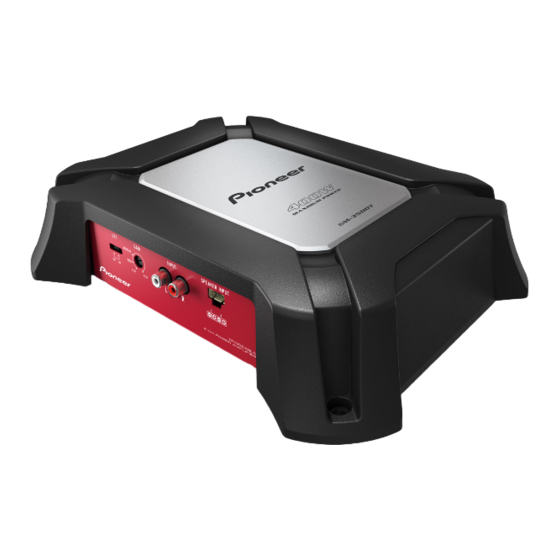Pioneer GM-3500T Owner's Manual - Page 11
Browse online or download pdf Owner's Manual for Amplifier Pioneer GM-3500T. Pioneer GM-3500T 37 pages. Bridgeable two-channel power amplifier
Also for Pioneer GM-3500T: Owner's Manual (14 pages), Owner's Manual (45 pages)

Additional information
Specifications
Power source ............................. 14.4 V DC (10.8 V to 15.1 V
Grounding system ................... Negative type
Current consumption ............ 15 A (at continuous power,
Average current drawn ......... 4 A (4 W for two channels)
Fuse ................................................ 25 A × 1
Dimensions (W × H × D) ... 289 mm × 62 mm ×
Weight .......................................... 2.0 kg (4.4 lbs)
Maximum power output ....... 400 W (200 W × 2)
Continuous power output ... 60 W × 2 (at 14.4 V, 4 W,
Load impedance ...................... 4 W (2 W to 8 W allowable)
Frequency response ............... 10 Hz to 70 kHz (+0 dB, –
Signal-to-noise ratio ............... 98 dB (IHF-A network)
Distortion ..................................... 0.05 % (10 W, 1 kHz)
Low pass filter:
Cut off frequency ........... 80 Hz
Cut off slope ..................... –12 dB/oct
Gain control:
RCA ...................................... 200 mV to 6.5 V
Speaker .............................. 0.8 V to 26 V
Maximum input level / impedance:
RCA ...................................... 6.5 V / 22 kW
Speaker .............................. 26 V / 22 kW
CEA2006 Specifications
Power output ............................. 60 W RMS × 2 Channels (at
S/N ratio ....................................... 80 dBA (reference: 1 W into
allowable)
4 W)
7 A (4 W for one channel)
219 mm
(11-3/8 in. × 2-1/2 in. ×
8-5/8 in.)
(Leads for wiring not in-
cluded)
20 Hz to 20 kHz, ≦ 1.0 % THD
+N)
185 W × 1 (at 14.4 V, 4 W
BRIDGE 1 kHz, ≦ 1.0 % THD
+N)
85 W × 2 (at 14.4 V, 2 W,
1 kHz, ≦ 1.0 % THD+N)
3 dB)
14.4 V, 4 W and ≦ 1 % THD
+N)
4 W)
Notes
! Specifications and the design are subject to
modifications without notice.
! The average current drawn is nearly the maxi-
mum current drawn by this unit when an
audio signal is input. Use this value when
working out total current drawn by multiple
power amplifiers.
Appendix
11
En
